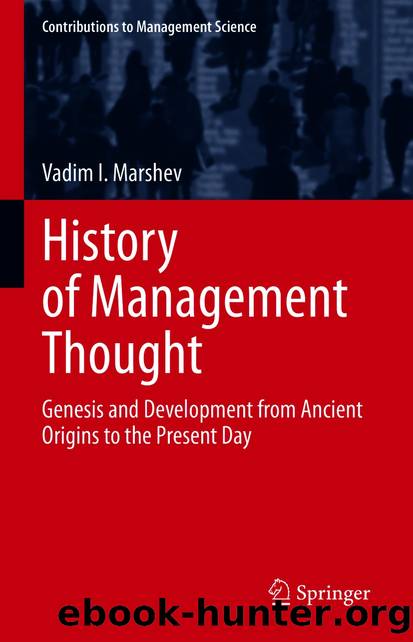History of Management Thought by Vadim I. Marshev

Author:Vadim I. Marshev
Language: eng
Format: epub
ISBN: 9783030623371
Publisher: Springer International Publishing
the state of the material base of educational institutions,
the composition and ratio of compulsory and special disciplines,
relevance and effectiveness of training programs,
the availability of teachers and the level of their special training.
Changes in the sectoral structure of the countryâs economy gave rise to changes in the choice of educational careers in Russian societyâlarge merchant families began to send their children to higher technical institutes and schoolsâSt. Petersburg, Kiev and Warsaw Polytechnic Institutes, to the Imperial Moscow Higher Technical School, etc. At the end technical universities, graduates with an engineering degree showed much faster managerial competencies in enterprises, starting from the position of chief engineer in the production, and became managers of the middle- and top-level enterprises, and even directors of the Board of various partnerships. At the same time, many of the graduates of Russian technical universities, having gained experience in economic and managerial activities in private companies and at the state level, were invited as teachers and professors of educational institutions [68, 70â73].
In general, observing only the development of âpersonnelâ issues at three Russian congresses, the following conclusions may be drawn. First, the problem of the quality of training for production managers and professionals was understood by scientists and practitioners throughout the entire period under review. Second, the main reasons for the constant recourse to this issue were the insufficient number of educated managers and specialists and the lack of their specialized management training. Third, the need for special training for future leaders, primarily due to their profession, that is to say, a complex of technical and social tasks, has been consistently noted (with increasing urgency).
Listed conclusions, which is least relevant to HMT, but rather to Management Science, can even be strengthened and specificated, considering that similar issues had been raised in virtually all the sectoral and regional so-called provincial congresses, were reflected in the work and minutes of special meetings (all-Russian and regional, scientific and technical), in the materials of commissions on the position of various industries, at meetings of business organizations.
These conclusions are most clearly found in the materials of industry commissions and the works of societies. This is due to the specifics of these materials, as tools that rapidly respond to the reactions of scientists and practitioners to emerging management issues, to the process of confronting ideas and perceptions, to the clash of science and practices that give rise to new problems and issues. The link in this pattern is mutual and we have been able to find a few vivid examples of its operation both on the one side and the other. This is the case for many years of discussions and often corresponding changes in the organization of centralized and decentralized management of Russian industries (mining, railway, metallurgical and metallic industries, sugar and distillery industries, education), economic measures affecting industry, agriculture, transport, trade (credits, tariffs, duties, taxes, prices), legal and organizational problems of economic management (industrial statute, factory legislation, organizational structures; functions, rights and duties of employees and workers), information and statistical aspects of
Download
This site does not store any files on its server. We only index and link to content provided by other sites. Please contact the content providers to delete copyright contents if any and email us, we'll remove relevant links or contents immediately.
Time Management Made Easy: How to Cultivate New Habits, Improve Productivity and Get Things Done by Joshua Strachan(2405)
The 7 Habits of Highly Effective People by Stephen R. Covey & Sean Covey(2256)
The Concise Laws of Human Nature by Robert Greene(1893)
Doesn't Hurt to Ask by Trey Gowdy(1633)
Primal Leadership by Daniel Goleman(1273)
Hook Point: How to Stand Out in a 3-Second World by Brendan Kane(1230)
Don't Sweat the Small Stuff...and It's All Small Stuff by Richard Carlson(1114)
HBR's 10 Must Reads 2021 by unknow(1094)
The Power of 100! by Shaun King(1063)
Amazon Unbound by Brad Stone(1039)
100 Things Successful People Do by Nigel Cumberland(1025)
Master of One by Jordan Raynor(999)
HBR's 10 Must Reads 2021 by Harvard Business Review(997)
The Job Closer by Steve Dalton(992)
Declutter Your Mind: A step by step guide to learn to control your thoughts, stop worrying, relieve anxiety and eliminate panic attacks and negative thinking by Mia Chandler(961)
Lives of the Stoics by Ryan Holiday & Stephen Hanselman(956)
The Book of Hope by Jane Goodall(867)
Conflicted by Ian Leslie(862)
Coders at Work: Reflections on the craft of programming by Peter Seibel(844)
